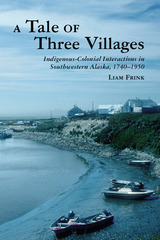7 start with S start with S
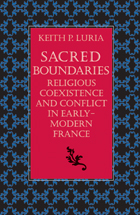
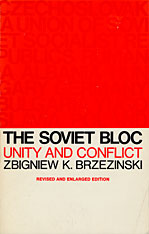
This is the first full-length study of relations among the communist states. The study explores the implications of the status of Yugoslavia and China, the significance of the Hungarian revolution and the position of Poland in the Soviet bloc, and clarifies the Khrushchev–Gomulka clash of 1956 and the complex role of Tito. Zbigniew Brzezinski emphasizes the role of ideology and power in the relations among the communist states, contrasting bloc relations and the unifying role of Soviet power under Stalin with the present situation. He suggests that conflicts of interest among the ruling elites will result either in ideological disputes or in weakening the central core of the ideology, leading to a gradual decline of unity among the Communist states.
The author, while on leave from his post as Professor and Director of the Research Institute on Communist Affairs, Columbia University, and serving on the U.S. State Department’s Policy Planning Council, has revised and updated his important study and added three new chapters on more recent developments. He gives particular attention to the Sino–Soviet dispute.
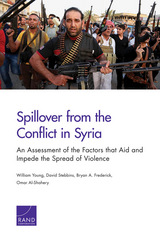
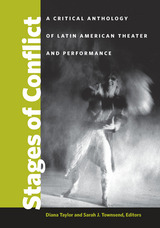
"An invaluable resource to teachers of Latin American theater, with texts that provide an accurate panorama of Latin American theater."
---Adam Versenyi, University of North Carolina at Chapel Hill
"A most welcome and needed collection . . . Not only is it the first English-language anthology of theater and performance in Latin America from the Conquest onward, but it also includes excellent introductory and background material . . . certain to become an essential source book."
---Marvin Carlson, City University of New York
"A rich resource for teachers and students, and for everyone intrigued by the history of performing Latin America . . . Diana Taylor and Sarah Townsend locate an animating tension between indigenous and colonial performance practices, and between the irreducibly local character of performance and the insistent pressure---as visible in the sixteenth century as in the twenty-first---of a globalizing, often oppressive modernity."
---W. B. Worthen, Barnard College, Columbia University
Stages of Conflict brings together a vast array of dramatic texts, ambitiously tracing the intersection of theater and social and political life in the Americas over the past five centuries. Including eighteen works faithfully translated into English, the collection moves from a sixteenth century Mayan dance-drama to a 2003 production by the first published indigenous playwright in Mexico. Historical pieces from the sixteenth century to the present highlight the encounter between indigenous tradition and colonialism, while contributions from modern playwrights such as Virgilio Pinero, Jose Triana, and Denise Stolkos take on the tumultuous political and social upheavals of the past century.
The editors have added comprehensive critical commentary that details the origins of each play, affording scholars and students of theater, performance studies, and Latin American studies the opportunity to view the history of a continent through its rich and diverse theatrical traditions.
Diana Taylor is Director of The Hemispheric Institute of Performance and Politics and Professor of Performance Studies and Spanish at New York University. Her books include the award-winning volume The Archive and the Repertoire: Performing Cultural Memory in the Americas.
Sarah J. Townsend is a doctoral student at New York University.

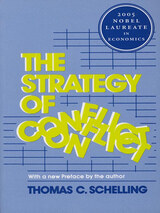
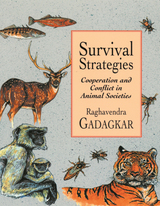
Did you know that Tasmanian hens have two husbands? That cellular slime molds commit suicide? That vampire bats will share food with hungry fellow bats and that hanuman langurs commit infanticide? Why creatures great and small behave in such fascinating and seemingly perplexing ways is explained in this delightful account of the evolutionary foundations of animal social behavior.
Only in recent years have biologists and ethologists begun to apply careful evolutionary thinking to the study of animal societies--and with spectacular results. This book presents the choicest of these findings, with a remarkable wealth of insights into the myriad strategies that animals have developed to perpetuate their kind. In an irresistible style, Raghavendra Gadagkar explores the strategies of cooperation and conflict adopted by animals--from the lordly lion to the primitive wasp worker--as they choose mates, raise their young, communicate with others, and establish the division of labor necessary to feed and protect the group and safeguard their territory.
Whether focusing on the birds or the bees, this book offers both superb descriptions and lucid explanations of many different behaviors encountered in the animal world: why a ground squirrel will sound an alarm--even risk its own safety--to warn fellow squirrels of impending danger; why weaver ant larvae donate silk for nest building; why house mice raise their offspring in a communal nursery; and how animals can recognize the relatives they want to favor--or avoid.
Illustrated with both photographs and explanatory diagrams, this expert and inviting tour of the social world of animals will inform and charm anyone curious about the motivations behind the amazing range of activity in the animal kingdom.
READERS
Browse our collection.
PUBLISHERS
See BiblioVault's publisher services.
STUDENT SERVICES
Files for college accessibility offices.
UChicago Accessibility Resources
home | accessibility | search | about | contact us
BiblioVault ® 2001 - 2025
The University of Chicago Press






